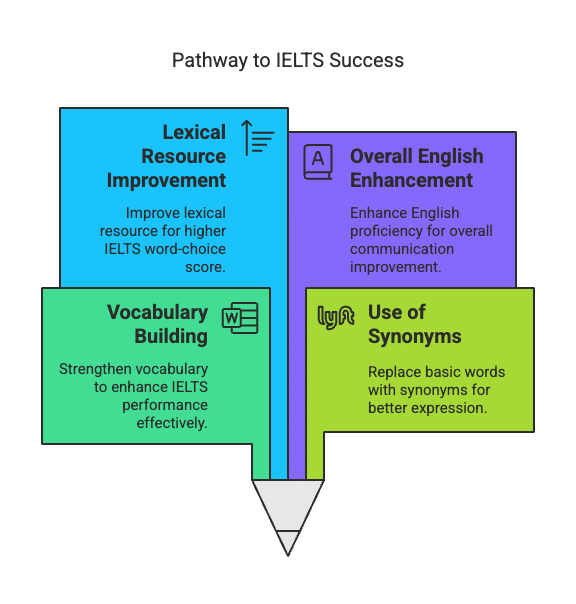IELTS Exam > IELTS Notes > Vocabulary for IELTS > A List of the Most Common Synonyms
A List of the Most Common Synonyms | Vocabulary for IELTS PDF Download
| Table of contents |

|
| Introduction |

|
| Why Synonyms Matter |

|
| How to Use Them |

|
| Synonym List for IELTS |

|
Introduction
- A smart way to raise your IELTS score is by building a stronger vocabulary.
- One of the simplest tricks to do this is using synonyms—words that mean the same thing but swap out basic ones for something sharper.
- This not only pumps up your Lexical Resource score (the word-choice part of IELTS) but also makes your English sound better overall.
- Here’s how synonyms can help you shine and a handy list to get you started.

Why Synonyms Matter
- IELTS tests how well you use words, especially in Writing and Speaking.
- Sticking to plain words like good, bad, or big over and over looks weak and boring.
- Synonyms let you switch it up—say great instead of good, awful instead of bad, or huge instead of big.
- This shows examiners you’ve got a wide vocabulary and can pick the right word for the job, pushing you toward a higher band.
- Plus, it’s a quick way to level up your everyday English, too.
How to Use Them
- Swap Smartly: Don’t just repeat “important” five times in an essay—try “key,” “vital,” or “crucial” instead. It keeps your writing fresh and shows control.
- Fit the Context: Pick synonyms that match the sentence. “Happy” could be “joyful” for a big feeling or “content” for a calm one—wrong picks like “thrilled” in a quiet moment sound off.
- Practice Daily: Grab a common word (e.g., “say”), find synonyms (e.g., “tell,” “state,” “claim”), and write a sentence with each: “She said hi,” “She told me hi,” “She stated her name.” This sticks them in your brain for test day.
Synonym List for IELTS
Here’s a short list of common words and their synonyms to boost your score. Learn these, and you’ll sound sharper without much effort:
- Good: Great, excellent, fine, superb
Example: “Play is good for kids” → “Play is superb for kids.” - Bad: Poor, terrible, awful, lousy
Example: “Bad habits hurt learning” → “Awful habits hurt learning.” - Big: Large, huge, vast, massive
Example: “It’s a big problem” → “It’s a massive problem.” - Important: Key, vital, crucial, essential
Example: “Reading is important” → “Reading is crucial.” - Help: Aid, assist, support, boost
Example: “Games help kids” → “Games boost kids.” - Say: Tell, state, claim, express
Example: “He said it’s true” → “He claimed it’s true.”
Some more common synonyms:

The document A List of the Most Common Synonyms | Vocabulary for IELTS is a part of the IELTS Course Vocabulary for IELTS.
All you need of IELTS at this link: IELTS
|
20 videos|6 docs
|
FAQs on A List of the Most Common Synonyms - Vocabulary for IELTS
| 1. What are synonyms? |  |
Ans. Synonyms are words or phrases that have similar meanings to another word or phrase. They can be used to enhance writing and communication by providing alternative words to convey the same idea.
| 2. Why are synonyms important in the IELTS exam? |  |
Ans. Synonyms are important in the IELTS exam because they demonstrate a wide range of vocabulary and language proficiency. Using synonyms effectively can help candidates avoid repetition and show their ability to express ideas in different ways.
| 3. How can I improve my knowledge of synonyms for the IELTS exam? |  |
Ans. To improve your knowledge of synonyms, you can:
- Read extensively and pay attention to different words used to express similar ideas.
- Use a thesaurus or online resources to find synonyms for common words.
- Practice using synonyms in your writing and speaking exercises to become familiar with their usage.
| 4. Can I use synonyms interchangeably in the IELTS exam? |  |
Ans. While synonyms can be used to add variety and depth to your language, it is important to use them correctly and in the appropriate context. Some synonyms may have subtle differences in meaning or usage, so it is crucial to understand these nuances before using them interchangeably.
| 5. Are there any specific synonyms that are commonly used in the IELTS exam? |  |
Ans. There are several synonyms that are commonly used in the IELTS exam, such as:
- Important: significant, crucial, essential
- Good: excellent, outstanding, superb
- Bad: terrible, awful, dreadful
- Benefit: advantage, benefit, gain
- Problem: issue, challenge, difficulty
- Solution: resolution, remedy, answer
It is advisable to expand your vocabulary and familiarize yourself with a variety of synonyms to effectively express your ideas in the exam.
Related Searches
















